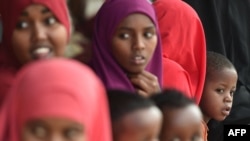NAIROBI, KENYA —
In Kenya, efforts are underway to better integrate refugees ahead of the planned closure of camps that house more than 400,000 people, mainly from Somalia, South Sudan and Congo. One project, backed by the International Rescue Committee, provides refugees with microloans to start small businesses.
Congolese refugee Enock Gatangi, 54, attends to customers at his small grocery shop in Nairobi’s Kayole neighborhood.
Gatangi fled conflict in the Democratic Republic of Congo in 2003 with his wife and child to Kenya’s Kakuma refugee camp, where they lived for 12 years.
They moved to Nairobi where he worked as a security guard while saving his money and dreaming of starting his own business.
But, like most refugees, Gatangi was unable to get even a small bank loan.
Then he joined the Rangers Family Group, a savings and loan association that in January lent him $170 to help finally open his shop.
I have so many customers, said Gatangi with a big smile, both Kenyans and Congolese. But most of my customers, he said, are Kenyans.
At their weekly meeting, the Rangers Family Group sings a traditional Congolese song to celebrate their savings.
They are one of 20 such groups supported by the International Rescue Committee in different poor neighborhoods in Nairobi.
The IRC program is called Refugees in East Africa: Boosting Urban Innovations for Livelihoods Development, or Re:Build.
It’s a 5-year project to empower 20,000 urban refugees with their own businesses in Nairobi and the Ugandan capital, Kampala.
The IRC says the micro-loans have already helped 260 refugees in Nairobi to become their own bosses.
Boniface Odhiambo is the Re:Build project manager.
“The fact that refugees themselves have faced challenges in terms of accessing financial products from the formal financial institutions, the project had to design innovative ways on how they can get access to financial services and also boost their economic livelihood initiatives,” Odhiambo said.
Under the program, refugees and locals form groups of 15 to 30 members who contribute shares.
The money is pooled in a mobile money application account that members can then borrow from as microloans to start and run a small business.
Members in Nairobi say the project has improved their economic well-being.
Shantal Zabibu chairs the Rangers Family Group in Kayole.
She said before the program they could not access funds for investment. But since they came together and pooled their resources, said Zabibu, if a member wants to borrow ten thousand Kenyan shillings ($90), they’ll get it. She said if another member wants five thousand ($45), they'll get it. Zabibu said their lives have improved since the came together as a group.
Kenya hosts about 550,000 refugees and asylum-seekers, 87,000 of them based in cities.
Their participation in Kenya’s economy hinges on integration, said project manager Odhiambo.
“When we focus on economic empowerment, we are giving the vulnerable or voiceless opportunity to also have a feel and contribution in the national cake,” Odhiambo said.
With Kenya’s government planning to close the Kakuma and Dadaab refugee camps in July, all eyes are on the authorities to see what steps they will take.
Integrated refugees like Gatangi hope that if the camps close, those who reside in them, like he once did, will be ready and able to live in Kenyan communities.




